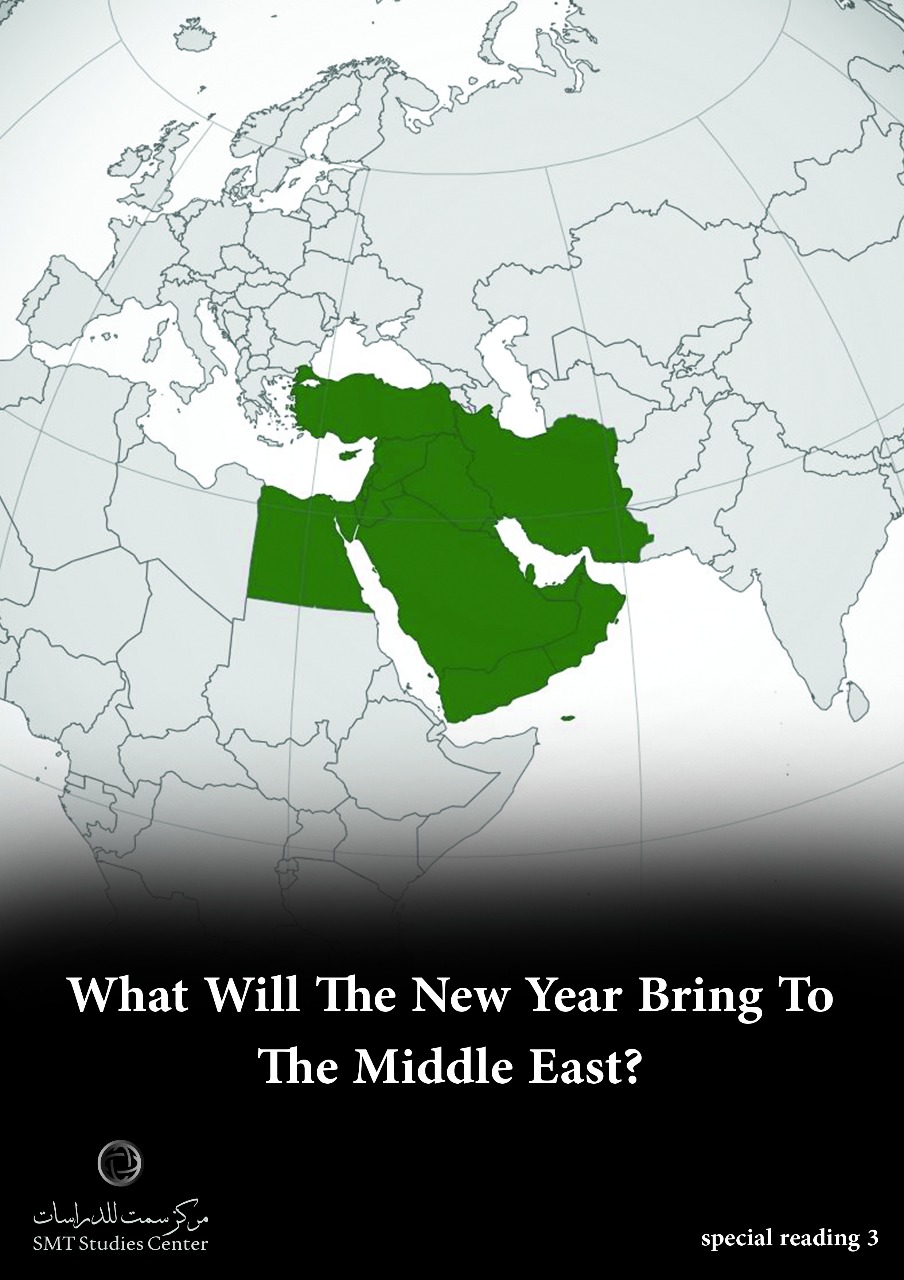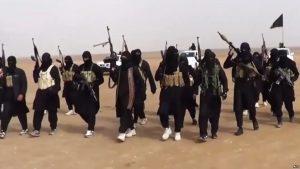Subscripe to be the first to know about our updates!

What Will The New Year Bring To The Middle East?
Foresighting the map of protracted conflicts and drivers of behavior for 2018
The Middle East has witnessed a number of political transformations aimed at bringing totalitarian regimes to a more democratic. They aspire to achieve developmental consequences in various economic and social fields in view of the period of transitional waves, instability and failures in economic and investment sectors. And that’s with an internal weakness, security deterioration and social decline which observed in the Arab arena in general
Besides that, There are general views sweeping the region eastward between sectarian tensions; the emergence of an armed transnational movement with structured agendas, specific programs and varying degrees of influence and influence, and that’s in conjunction with the emergence of a number of security issues with multiple inter- and intra-external effects, especially when they intersect with Different environmental and humanitarian determinants according to the umbrella of decision makers.
So, a number of researchers have sought various Arab and foreign academic seminars and seminars to explore different scenarios for the future of the Middle East in 2018 through the presentation of future visions for a number of issues in the region, with the most prominent of which are the concerns of sectarianism, and the actors across the nationalists as the ISIS and Hezbollah in Lebanon. As well as to focus on the future of regional conflicts in Syria, Libya, Yemen and various security, environmental and humanitarian issues.
The regional protracted crises for 2018
Our Arab world faces more and more interlocking issues, all of which clash with the fundamentals of the national state. Despite cautious progress in some of the region’s files to review the steps to support the stability, many experts and academics are likely to continue the security and political deterioration of the map of the Middle East, Which is agreed by the majority, whether Arabs or foreigners in various centers of thought, especially that the prospect of the reality of the Arab region is not only understanding the dialectical relationship between the local, regional and international, As well as the interrelationships in the Arab world politically and strategically between the inside and outside, and then there are three theoretical points, as declared by Dr. Fawaz Gerges, Professor of International Relations at the London School of Economics and Political Science, allows to explore the political situation in the Middle East next year, which are :

1 – Some Arab countries suffer structural crises, governance and the failure of the development process, as well as the crisis of power, which created a crisis of confidence with the citizen, creating a constitutional vacuum and security in the region, where some armed groups and organizations tried to fill this vacuum.
2 – There is a defect in the system of joint Arab collective action, which created a strategic vacuum, which exploited by some non – Arab countries, such as Iran, Turkey and Israel to a greater try to fill it.
3 – The American retreat in the last decade created an international vacuum that the Russian leadership is trying to invest in a clever way.
Thus, there are a number of political files that extended to the future of the Middle East, which will be deported for 2018, primarily the conflicts in Yemen, Syria, Iraq and Libya, the Russian-American and Palestinian-Israeli, and the map of terrorism and the future of transient actors. As well as the contradictory shifts between Sunnis and Shiites, democracy and authoritarianism, Israelis and Palestinians, Iran vs. Saudi Arabia, the refugee crisis and the internationalization of terrorism, which can be summarized according to the forecasts of the research centers with the following points:
1- The Yemeni file
Although the Yemeni conflict is entering a new phase, its course can change in the next two years. But in 2018, it seems that the Yemeni scene will witness a more dangerous and divisive escalation than the political solution, and that the political and field changes in the Yemeni arena will transform the ideological political conflict into a tribal conflict that could cause tribal wars led by revenge and nepotism, As well as more involvement of Iran in the Yemeni conflict, and the situation in Yemen next year, a very explosive situation.
On the other hand, there is the possibility of resolving with many evidence indicating the possibility of reaching a solution and the end of this long conflict at the end of 2018, the legitimacy in Yemen was able to impose its authority on three quarters of Yemen, and the decisive battle will be on only two cities, namely Sana’a and the port of Hodeidah , And if they are released, the map of the conflict will change radically, in comparison to the situation in Afghanistan, where the presence of the Taliban in the remote mountain areas, away from the main cities.
2 – Iraqi and Libyan political files
2018 appears to be returning to ballot boxes in key countries in the Middle East. We will find the Egyptian presidential elections in March 2018, and Lebanon’s parliamentary elections in May 2018. Libyan presidential and parliamentary elections are tentatively scheduled for mid-2018 and Iraqi parliamentary elections in May 2018.

For Iraq, we find a trend next year to be relatively stable, especially with the political victory achieved by Iraqi Prime Minister Haider al-Abadi, winning the organization of the Islamic State in Iraq and Syria, and thwarting the referendum on independence of Kurdistan . But the general evidence in light of the growing Iranian arms inside Iraq, says that the Iraqi government will not be able to deal with political, social and ideological crises. It also has to restructure the Iraqi state and formulate it on a unified and unified basis, not on sectarian federations.
While Libya, in 2018 we may see an interesting confrontation in the presidential race between the old guard General Khalifa Hafter, who served in the Libyan army before Chikha and Saif al-Islam, the son of former Libyan ruler Muammar Gaddafi. Especially as Hafter seeks to win the current presidency of the UN-backed National Reconciliation Government and Prime Minister Fayez al-Sarraj is likely to retain his post in that case. So let us wait if Libya is ready to secure and organize nationwide elections, and whether the prime ministers can restrain themselves and overcome the “mistrust” situation in working together.
3- The future of war in Syria
It is not believed that we can witness a breakthrough in the Syrian file. There is a “political fanfare.” Russia defines the rules of the game, especially as there is an implicit consensus that Assad will remain in power for the next stage under the extension of Iranian arms inside Syria.
On the other hand, a poll conducted by the Pew Research Center found that only a few of those polled in Israel, Jordan, Lebanon, Tunisia and Turkey were optimistic that the Syrian War will end next year, although many believe it will not last beyond the next five years.
He concluded that 26% of the people of the region believe that the war in Syria will end in the next year, while 32% believe it will end in the next five years, and 29% believe it will last for more than five years.

4- Palestinian -Israeli conflict
It is unlikely that we will not see any radical changes in the Palestinian – Israel file, especially that the current Israeli leadership, supported by the right wing in the United States, trying to change the rules of the game, and no longer accept the establishing of an independent Palestinian state with East Jerusalem as its capital.
In addition, the vision of the American president and the new leadership, represented in the decision to recognize Trump Jerusalem as the capital of “Israel”, dropped all the strategic areas of peace dialogues that he launched since entering the White House, this decision lacks the strategic vision and warns of rising tensions in the Arab region in the event of This decision is reversed and international resolutions are supported in reinterpreting the ambiguity of the Trump decision .
5- Russian-American influence in the region
It seems that Russia has become a difficult figure in the Arab and international arena, it is the most important player in the Syrian file, and sets the rules of the game, and it does not appear that the US leadership will try to lead the Arab region, and will remain the American retreat as it is , And the decision to recognize Jerusalem as the capital of “Israel” is an integral part of this confusion and ambiguity, thus reinforcing the idea that there is a gap and institutional division between the discourse And political action For the US.
6- The Gulf Crisis
It is likely that we will not see a breakthrough in the crisis with Qatar, especially as all parties are not ready to make concessions next year. Qatar’s leadership continues to challenge. Which depends on Turkey and Iran to try to cooperate, Qatar’s strategy is also clear, that depends on investment in diplomacy and in military and financial deals with foreign countries.
Thus, since the beginning of the Gulf crisis, the main question has been: Do Qatar wants to emerge from its social and cultural environment? This is the result of a response in Qatar’s moves to move forward and rely on non-Arab regional powers and Western powers. The possibility of a breakthrough in the current crisis is very small and may range between 30% and 40% .
7- Terrorism map in the Territory
Despite the dismantling of ISIS,” this does not mean the end of terrorism. We are likely to witness a change in the strategies of the armed Takfiri organizations and the map of terrorism. We will witness strategic attacks in light of the growing phenomenon of “returnees” and “jihadist transit”, and their attempts to spread instability in the region and hit the nerve of the economy.

in 2018 , The terrorism map is likely to be in the Triangle (Egypt, Libya and Sudan). and, it will be fateful for Egypt, because the Takfir groups are active in North Sinai. Even if Egypt succeeds in formulating a more successful military field strategy, This military strategy is the drying up of the human, arms and organizational sources of armed groups of “Takfiri”, which is indeed what Egypt is doing in the meantime, in exchange for the possibility of continuing weakness of Libya and the vulnerability of Sudan in facing the dangers of these terrorist and tyrannical organizations.
Based on the above.., the Foresight of the Middle East is intertwined internally and externally according to an implicit map that includes successive changes to the region’s operations in light of the escalation of violence associated with the “Takfir” and Transnational organizations, as well as the restructuring of the foreign agendas of the Russian and American in the international circles.
Political studies unit *
Resources
[1] – فوّاز جرجس: أزمات المنطقة تُرحّل إلى 2018، مركز الخليج للدراسات ،13/12/2017 .
http://www.alkhaleej.ae/alkhaleej/page/f94cd1e3-55c6-4f23-9dee-3ab76fab740d
[2] – The Arab Strategy Forum , http://www.arabstrategyforum.org/
[3] – Joe Macaron , The Middle East in 2018: Five issues to watch, 20 Dec 2017, https://www.aljazeera.com/indepth/opinion/middle-east-2018-issues-watch-171220074428325.html
[4] – Janell Fetterolf and Jacob Poushter, Key Middle East Publics See Russia, Turkey and U.S. All Playing Larger Roles in Region:Most do not expect Syrian war to end in 2018, DECEMBER 11, 2017, http://www.pewglobal.org/2017/12/11/key-middle-east-publics-see-russia-turkey-and-u-s-all-playing-larger-roles-in-region/
[5]– The U.S. Has Recognized Jerusalem as Israel’s Capital, What Happens Next?, Carnegie Middle East Center, http://carnegie-mec.org/diwan/74931
[6] – “What Putin Really Wants”: The Atlantic’s January, February Issue , DEC 11, 2017
[7] – The Arab Strategy Forum , http://www.arabstrategyforum.org/